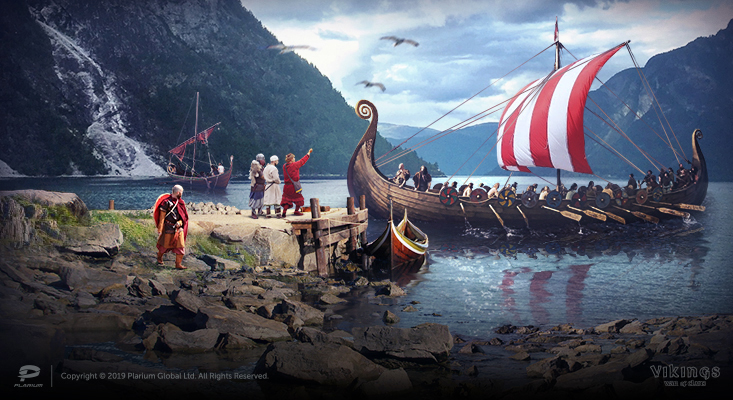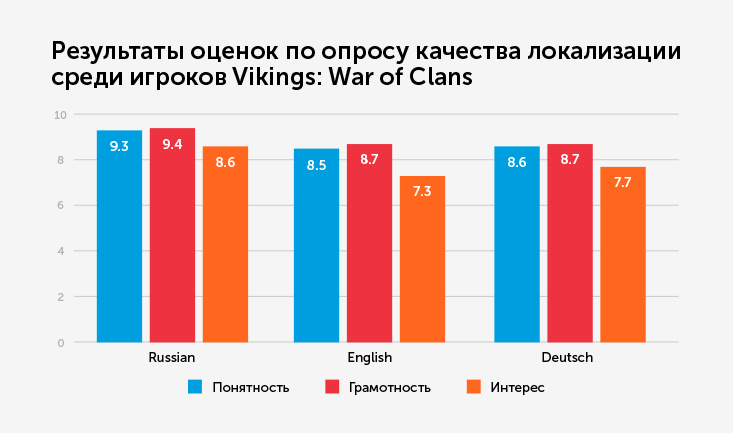How localization works in Plarium Krasnodar. Experience working on the game Vikings: War of Clans
The Plarium Krasnodar team in its column for App2Top.ru she told me how she localizes. She also shared a number of cases and approaches that she uses when adapting games for the international market.
Today, it is impossible to imagine a quality product without localization.
Localizers approach the adaptation of materials comprehensively, taking into account cultural differences, trying to preserve emotions, mood and the original author’s idea. This applies to any games that have texts and stories.
What is the work of localizers and what difficulties do they face? Let’s look at the example of the studio Plarium Krasnodar.
The main areas of work of the localization department
To begin with, let’s talk about what localizers do in our studio.
1. Working with incoming texts:
- receiving and rechecking texts from the Copywriting department;
- preparation of context, screenshots and additional materials, transfer of text for translation and proofreading — verification by a native speaker;
- quality control of the finished text (after translation and proofreading).
In one quarter, the localization department can subtract up to 180 thousand words and translate more than 110 thousand words (for comparison, in Leo Tolstoy’s novel “War and Peace” 188 thousand words).
2. Checking the quality of texts from the text database:
- regular search for descriptions and titles in the game that require corrections or replacements.
3. Updating the working base:
- transferring outdated materials to the archive;
- updating the glossary.
The specifics of the work on the example of the Vikings: War of Clans project
A comprehensive adaptation of texts is needed for any projects, whether it’s plot or non-plot games, games with meta-narrative, KKI (collectible card games) and even casual games. But in the case of MMORTS, text is one of the main ways to immerse the user in the setting. Language is important for characterization of characters, plot construction and creation of the game’s ent.
The texts must correspond to the setting, so the Plarium Krasnodar localizers have another area of work — a deep study of the subtleties of the Viking world, the study of Scandinavian mythology and reading materials about epic battles in the lands of the North.
We will not delve into abstract reflections, but will share with you the most interesting cases that we have encountered in the work of our localization department.
The pitfalls of Scandinavian mythology
In the game, specific terms are often used: Supreme Ting, Jomsvicking, As. In one of the tasks, which is called “To convene a ting”, the translators confused the word “ting” (in English, “thing” is an Old Norse people’s assembly) with the word “thing”, which is also spelled in English. The term “Drakkar” — a wooden ship — was suggested by some to be translated as “boat”.
The adaptation of such words causes particular difficulties in Japanese, Korean and Turkish, since the Scandinavian names in them do not have a dictionary equivalent and are not at all heard. In such cases, we use transliterated variants to follow the game’s setting and preserve the atmosphere.
More game updates — more new words
The game is alive, updates are constantly happening in it, new features are being added and, accordingly, new terms. Because of this, there are situations when exact translations of some words have already been used before and have taken root in the game. In such cases, it is necessary to look for analogs that are close in value.
There was one difficult task associated with this when adapting the term for the Turkish version of the game. Initially, the concept of “King” appeared in the project, denoting the supreme ruler in the era of the mature Middle Ages (in the English version “Konung”). For the Turkish user, the word was translated as “King” — “Kral”.
When a new term “Ruler” appeared later in the game (in the English version “King”), it turned out that the literal translation for him was already busy. We started searching for a suitable equivalent and eventually chose “Imparator”, which translates as “Emperor”. Other variants (for example, “Hükümdar” and “Padişah”) would cause users to have unnecessary associations with the Ottoman Empire.
At the junction of translation and poetry
Sometimes we have a need to work not only with prose forms, but also with poems. It was especially interesting to adapt the texts stylized as the “Elder Edda” — a poetic collection of Old Norse songs about the gods and heroes of Scandinavian mythology.
A good example was in French. The translator used transcription, he felt the emotional message of the source text and composed an analogue in his own language, taking into account all the semantic subtleties. This is not just a translation, but real poetry, imbued with the spirit of the Viking age.
When not to trust machine translation
A funny incident happened with a recent greeting that we prepared for March 8. Posts for Facebook are not localized, since this social network translates texts from English to other languages automatically.
So it happened with the publication in Spanish. In the greeting there was the word “warriors” (shieldmaidens), which Facebook’s automatic translation function turned into “camareras”, which means “waitresses”.
Cultural features
Games from Plarium Krasnodar are now being translated into 9 languages, they are played by people all over the world. This means that we need to take into account the cultural characteristics of different peoples and avoid topics that are undesirable for them.
So, having a negative military color for the German audience, the word “blitz” (blitz) in the name of the new competition “Blitz: Holding the Throne” (Blitz: Holding the Throne) was decided not to mention, although in German it is used even in chess. It was replaced with “zack”, which means “come on, come on/hurry up” (chop-chop/zap). And for “Festive Blitz: Invaders” they used “Spontanfeier: Eindringlinge” with the meaning “spontaneous celebration” (spontaneous celebration / fest).
Translate the untranslatable
There are a lot of references in the Vikings: War of Clans game, including in the names of achievements. For example, “The very Baron” (Cannonball Baron) is an allusion to Baron Munchausen.
In some languages, such as Japanese and Italian, the original name has been preserved. But since Baron Munchausen is not popular enough in all cultures, there were languages for which we had to look for an alternative.
According to the original idea, we needed an association with a person flying out of a cannon, which would prompt players to think about the meaning of the achievement. For this purpose, the name of the circus act “Hombre bala” \ “Homme-canon” (English “Human cannonball”) was used in Spanish and French.
In Turkish, the native speaker suggested using the name of the famous traveler of the 17th century Evliya Çelebi (Evliya Çelebi). This option had to be abandoned, since it is a proper name that does not cause associations with a specific form of displacement.
All names are fictitious, all coincidences are random
Sometimes it may happen that a made-up word that sounds quite normal in one language is consonant with unacceptable vocabulary, specific slang or well-known trademarks in others.
We try to keep track of such moments. For example, we analyzed the names of the Kingdoms in Vikings: War of Clans (there are more than 800 in the game, and this number is constantly growing). He showed that in some cases our names can cause undesirable associations, so we replaced them with more suitable ones.
***
As you can see, localization involves tracking a lot of factors. This is a laborious job, but it helps to increase user loyalty, shape the image of a high-quality game and keep in touch with your gaming community.
Speaking about the players, we can safely say that most of them are happy with our texts. In March 2021, we conducted an in-game survey among users about the localization quality of Vikings: War of Clans.
The survey was conducted by more than 135 thousand players. They assessed the clarity, literacy and interest of the texts in the game. We received the most responses from users who play in Russian, English and German.
Have you ever encountered the localization of a game that left a mark on your memory? Share in the comments!





